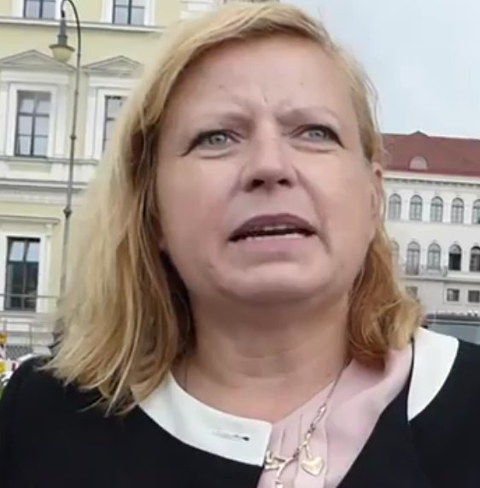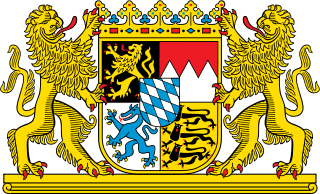

Source: MdL Gabi Schmidt demonstriert mit Mitarbeitern des Euorpäischen Patentamts
 Summary: Some German politicians do care about the welfare of EPO staff, a lot more so than the EPO's management that is actively crushing this staff
Summary: Some German politicians do care about the welfare of EPO staff, a lot more so than the EPO's management that is actively crushing this staff
WHILE we cannot be sure when exactly it happened, possibly this morning based on the timestamp (16/02/2017), SUEPO, the staff union of the EPO, published an English translation of text that was first published there 3 days ago in German. We have decided to preserve the text here (in English at least) as SUEPO has already been censored by threats and is still under perpetual attacks from Battistelli. The text below is self explanatory and Gabi Schmidt is named in it. Schmidt has been notably supportive and sympathetic towards EPO staff [1, 2, 3, 4, 5, 6] (credit to her! She supports other good causes). The emphases below are in the original, too.
Bayerischer Landtag Bavarian Regional Government 17th Election Period
02.02.2017
Printed item 17/15259
Motion
by the Deputies Hubert Aiwanger, Florian Streibl, Gabi Schmidt, Prof. (Univ. Lima) Dr. Peter Bauer, Dr. Hans Jürgen Fahn, Günther Felbinger, Thorsten Glauber, Eva Gottstein, Joachim Hanisch, Johann Häusler, Dr. Leopold Herz, Nikolaus Kraus, Peter Meyer, Alexander Muthmann, Prof. Dr. Michael Piazolo, Bernhard Pohl, Dr. Karl Vetter, Jutta Widmann, Benno Zierer, and Fraction (FREE VOTERS)
Nothing new in Munich: At long last, ensure the safeguarding of the fundamental rights of the personnel of the European Patent Office!
The Regional Government should resolve:
1. The Regional Government finds that:
The social situation of the personnel of the European Patent Office has not improved, the President of which has to date not implemented the measures adopted on 16 March 2016 by the Administrative Council for the improvement of the social situation, and the non-binding results of the “EPO Social Conference” of 11 October 2016 have to date not brought about any changes.
The State Government is called upon, against this background, to press hard on the Federal and European level for the fundamental rights to be upheld of the personnel of the European Patent Office, with headquarters in Munich.
Grounds: The situation in respect of labour law of the employees of the European Patent Office (EPO) continues to be precarious. The requirements put by the Administrative Council to the President of 16 March 2016 have to date still not been implemented, and the “EPO Social Conference” of 11 October 2016 has likewise produced only non-binding results, and these too are awaiting implementation. A whole range of major intrusions into essential fundamental rights of the employees continue to be a source of complaint on Bavarian soil, or are about to be imposed:
1. Persons temporarily off work due to illness are obliged to be present at their domicile between 10.00-12.00 and 14.00-16.00 hours (and longer). In order to allow for checks to be carried out, this ruling also includes access to protected residential areas. Presence will be checked, and medical examinations demanded. Without an exemption having been successfully applied for, it is not permissible to leave the place of residence during this period. This is tantamount to interference in personal rights, the right of integrity of the place of residence of the persons concerned, and the rights of the family members of the person concerned.
2. Persons unfit for duty of less than 10 years unfitness for duty remain on active service on sick leave. These persons must remain at home permanently. Expatriates from other countries do not have the possibility, during their illness, to stay in their home country, among their closest family members, which constitutes a serious intrusion into general personal rights, and the right of determination of place of residence of the persons concerned. It is self-evident that this also affects the family members of the persons concerned, since their life partners are compelled to remain in Germany.
3. Persons who are unfit for duty in the long term remain under prohibition of undertaking any employment, even activities which are unpaid or charitable. This represents an intrusion into general personal rights and physical integrity, if, for example, such an activity contributes to improving the state of health of the persons concerned. There are no exceptions provided for in this respect, with the result that even in medically justified cases the absolute prohibition remains in place. Actual examples from practice show that this is applied under any circumstances.
4. Loyalty obligations of the employees are being extended. Even outside the work context, good behaviour is demanded of the employees, such that the ruling goes beyond the provisions of the Statute of Civil Servants of the EU (Article 12) or the Federal Civil Servants Law (Art. 61, Para. 1, Clause 2): In those cases, all that applies is the activity-related obligation of good conduct (including outside the framework of service) which is linked to the particular position. This too represents an infringement of the right of self-determination, the freedom to express opinion, and the freedom of gathering and of association.
Printed items, plenary reports, and the agendas of the full assembly and the subcommittees can be called up on the Internet at www.bayern.landtag.de – Dokumente. The current session overview is available at www.bayern.landtag.de – Aktuelles/Sitzungen
5. Passive voting rights are restricted. An employee must in principle make known to the EPO their candidature for public office. Contrary to the almost identically wording in the Statute of European Civil Servants, however, in this case no provisional protection of rights pertains, and accordingly no procedure, based on the principles of a state governed by law, of receiving a definitive decision in good time before a forthcoming election as to whether a candidature will be permitted. In the national law relating to civil servants, by contrast, there are restrictions on passive voting rights only in a few exceptional cases.
6. The right of demonstration is restricted. The organizers of the demonstrations in Munich have in the past already been threatened with consequences in respect of their rights of service. A demonstration planned for the end of February 2015 was suppressed in this manner. Accordingly, the right of association and of free expression of opinion are therefore also affected.
7. Interference in core areas of staff union activity has been incurred, inasmuch as, by way of the EPO service regulations, individual members acting in a union capacity have been penalized. A number of members of the leadership of the IGEPA/SUEPO union were dismissed in 2015/2016, both at The Hague as well as in Munich. Accordingly, the right of association, i.e. the right to free union activity, has been infringed. Moreover, this union, which represents more than 50 percent of the employees and pensioners of the EPO, has been excluded from the “social dialogue” by the President.
8. The right to strike has been severely curtailed, inasmuch as the President of the European Patent Office issues edicts as to whether and on what scale strikes may be held. Strike participants must register themselves. Under threat of sanctions, they are obliged to notify their participation to their superiors. The decision to strike has therefore been withdrawn, and with it the fundamental power of organization and decision inherent in a union. This is a massive contravention of the right to free association.
9. Internal Office investigations are carried out in accordance with the “Investigation Guideline” without any basis for empowerment. The President has recourse to this on his own initiative, without any participation by the Administrative Council. Moreover, the investigation authority established for this purpose is not answerable to any (judicial) supervision.
10. The individual rulings of the Investigation Guideline are highly questionable with regard to the status of the employees under labour law: A simple oversight can incur disciplinary measures. Moreover, it is not permitted to involve third parties in the proceedings. The employee’s superior must be notified of interviews by the investigation authority, which leads to loss of respect and stigmatisation, without any accusation of culpability having been confirmed. There is no right, moreover, for a statement to be refused and not incur self-incrimination, since otherwise disciplinary measures are threatened. Defence of the person concerned by advocate representation is excluded. At the most, advice may be obtained from an attorney, but even the choice of attorney is restricted: Despite an attorney’s function as an independent element of due legal process, he is obliged to conclude a confidentiality agreement beforehand with the EPO. Employees against whom an investigation is being conducted cannot be accompanied by an attorney. Only a fellow employee is permitted to attend, who can only function as an observer. Any attempt at involvement by the observer incurs sanctions, up to the complete exclusion from such proceedings in future. Since, as a rule, staff representatives are the accompanying persons, there is interference here too into the core area of staff representation. Moreover, the person concerned has no access to the items included in the report on the proceedings. He is thereby kept ignorant of any evidence and investigation findings. The Investigation Guideline, which is being implemented in the European Patent Office on Bavarian soil, is therefore a contravention of Article 6 of the European Convention on Human Rights, Article 47 of the European Charter of Fundamental Rights, Article 14 of the International Pact on Civil and Political Rights, and Articles 55 ff. of the International Criminal Court (ICC) Statute with regard to the rights of the person concerned in legal proceedings.
11. The internal system for protection of rights has been undermined. The internal appeal body, for example, has only a consultative function. Its findings are simply recommendations to the President, to which he is not bound: The final decision on the future of the employee is at the free discretion of the President. In Decision No. 3785 of the Labour Court in Geneva (ILO-AT), which has jurisdiction with regard to EPO employees, it was ruled that the composition of the appeal body is not properly legal, since in the present case it was not made up in parity of President and personnel representatives: The personnel representatives were prevented from assigning to the appeal body the two representatives pertaining to them. Accordingly, despite attention having been drawn in the appropriate manner, the President is at present deliberately ignoring the authority vested in the personnel representation body to assign their own representatives to the internal appeal body (Articles 5 and 36 of the Statute).
12. The ILO-AT does not offer the employees any effective legal protection. The proceedings at present take about 10 years to be heard. Oral hearings have no longer been held for about 25 years. Legal advice and instruction regarding the situation de facto and de jure are not issued prior to the pronouncement of judgment, with the result that the parties have no possibility of expressing a view on the factual and legal situation on the basis of the legal interpretation adopted by the court. The right to a legal hearing of the participants in the proceedings is infringed.
The governance problem of the European Patent Office is therefore abundantly obvious: There is no effective control over the President of the European Patent Office, which is leading to the arbitrary treatment and disenfranchisement of the staff. Their situation at the headquarters of the Office in Munich is therefore a Bavarian matter, if enshrined fundamental rights are being called into question on the soil of our Free State. The State Government must take action accordingly, on a national and European level, to counteract this. The Federal Republic of Germany, as a Member State, and the European Commission as observers, are represented on the controlling body responsible, the Administrative Council of the European Patent Organization.
gabi.schmidt@fw-landtag.de or her phone number, +49 9163 9972063. She seems like an amicable, well-meaning person. ⬆